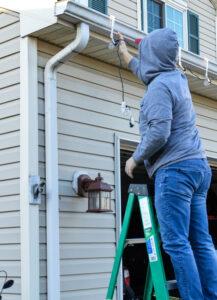Christmas Light Safety Tips

While National Lampoon’s Christmas Vacation is just a movie, the light safety risks in the story can definitely be real. Your beautiful holiday light display can quickly turn your holiday cheer into holiday terror. From knowing how to install lights to which electric light display you should invest in, here’s how you can keep your family safe and your Dallas electricity bill low this holiday.
Holiday Light Dangers
Your holiday light display poses two kinds of dangers: from installation and the lights themselves.
Over 5800 people on average injure themselves during the holidays when decorating. From falling from ladders or furniture to tripping on loose light cords, decorating for the holidays is a dangerous activity.
To avoid injuries during installation, make sure to:
- Place the ladder on an even surface
- Move your ladder if there’s an area you can’t reach safely
- Have someone spot you to secure your ladder
- Avoid standing on furniture to hang decorations. Use a ladder or step-ladder instead
- Keep the floor tidy without loose cords and items in the way
Outdoor Holiday Light Safety Tips
You can’t use indoor Christmas lights to decorate the outside of your house. You need to check the label on the box to ensure they’re weatherproof. A UL rating of damp or wet is the least you need for outdoor light displays. Otherwise, the snow or rain can quickly ruin them, make them a fire hazard, or even risk electrocution.
Connectors and plugs used for your outside light displays should also be suitable for outdoor use. Use an outlet with a ground-fault circuit interrupter (GFCI) to avoid electrical shock and protect your home’s electrical system. If the outlets get wet or the circuit overloads, the GFCI will shut the power off automatically.
Your Christmas lights rarely reach the nearest plug. So, when you use an extension cord, ensure it’s certified for outdoor use. Also, placing them out of the way behind bushes prevents them from becoming a tripping hazard.
Indoor Light Safety Tips
Even though outdoor lights can withstand the weather, they’re not optimal for indoor use. You need lights safety tested to prove they’re not a fire hazard to your Christmas tree.
Indoor Christmas lights can also be dangerous for small children or pets. This is especially true for puppies and kittens eager to chew on wires. Using a cord protector on the tail of your Christmas tree lights (the part with no lights) can prevent their electrocution. And always check your lights for evidence of chewing before plugging them in to prevent fire hazards.
Opt for lower voltage LED lights with plastic bulbs instead of delicate glass bulbs. Plus, LED lights are more efficient, so you save money on electricity.
But, just because they’re cheaper to operate doesn’t mean that you can use way more lights. Be careful not to overload your home’s electrical circuit. Plus, you also need to be mindful of any broken or missing lights from the cord, as these are fire hazards. The more lights you have, the harder it is to monitor them.
Finally, make sure you unplug your Christmas tree lights at night. For one, it’s wasteful to keep them on, and you just drive your electric usage higher. But, shutting them off also protects the pets you can’t keep an eye on when you’re asleep.
A Better Deal to Power Your Lights
The final, unspoken danger of Christmas lights is how much electricity they use. While switching to LED lights can lower your electric bill, nothing saves money like getting a good deal to begin with.
You can find the best electricity deals in Texas at https://www.texaselectricityratings.com/, where you can compare the rates and find a plan that’s right for you.
